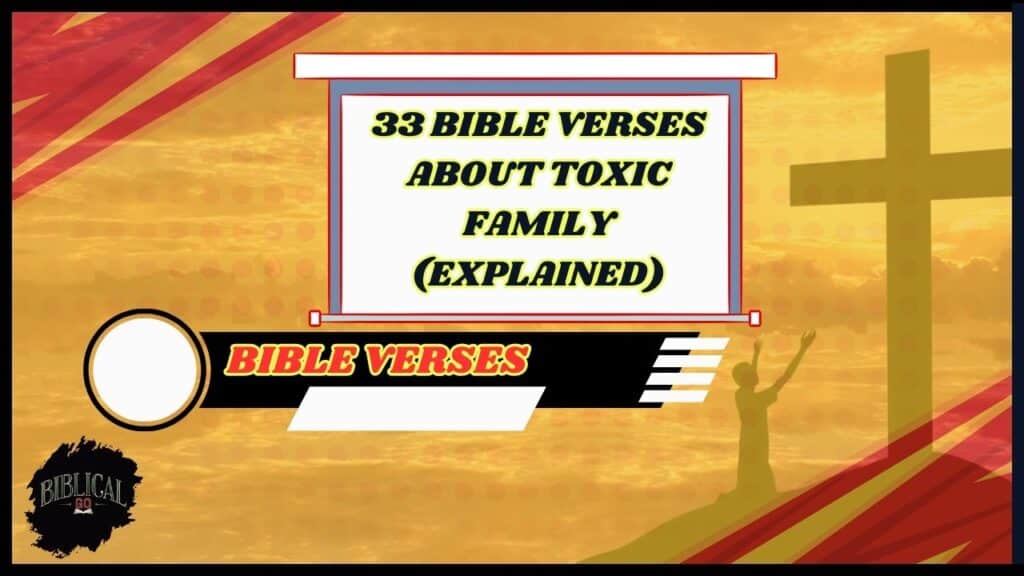Bible Verses About Toxic Family: Navigating family relationships can be one of life’s greatest joysand sometimes its most profound challenges. While Scripture often emphasizes honoring family, it also acknowledges the reality that family dynamics aren’t always healthy.
The Bible doesn’t shy away from portraying dysfunctional families. From Cain and Abel to Joseph’s jealous brothers, Scripture presents an honest view of family conflict and provides wisdom for those struggling with toxic relationships.
God’s Word offers guidance, comfort, and boundaries for believers facing difficult family situations. These verses remind us that while family is important, our ultimate identity and belonging come from our relationship with God.
Setting Healthy Boundaries with Toxic Family Members
1. Proverbs 22:24-25
“Do not make friends with a hot-tempered person, do not associate with one easily angered, or you may learn their ways and get yourself ensnared.”
This wisdom applies to all relationships, including family. God warns us that close association with volatile people affects our own character and emotional health. You can love family members from a distance that protects your wellbeing.
2. 2 Timothy 3:1-5
“But mark this: There will be terrible times in the last days. People will be lovers of themselves, lovers of money, boastful, proud, abusive, disobedient to their parents, ungrateful, unholy, without love, unforgiving, slanderous, without self-control, brutal, not lovers of the good, treacherous, rash, conceited, lovers of pleasure rather than lovers of God—having a form of godliness but denying its power. Have nothing to do with such people.”
Paul describes toxic behaviors that can manifest in any relationship, including family. The instruction to “have nothing to do with such people” gives biblical permission to create distance from those who consistently demonstrate harmful patterns, even relatives.
3. Matthew 10:34-36
“Do not suppose that I have come to bring peace to the earth. I did not come to bring peace, but a sword. For I have come to turn ‘a man against his father, a daughter against her mother, a daughter-in-law against her mother-in-lawa man’s enemies will be the members of his own household.'”
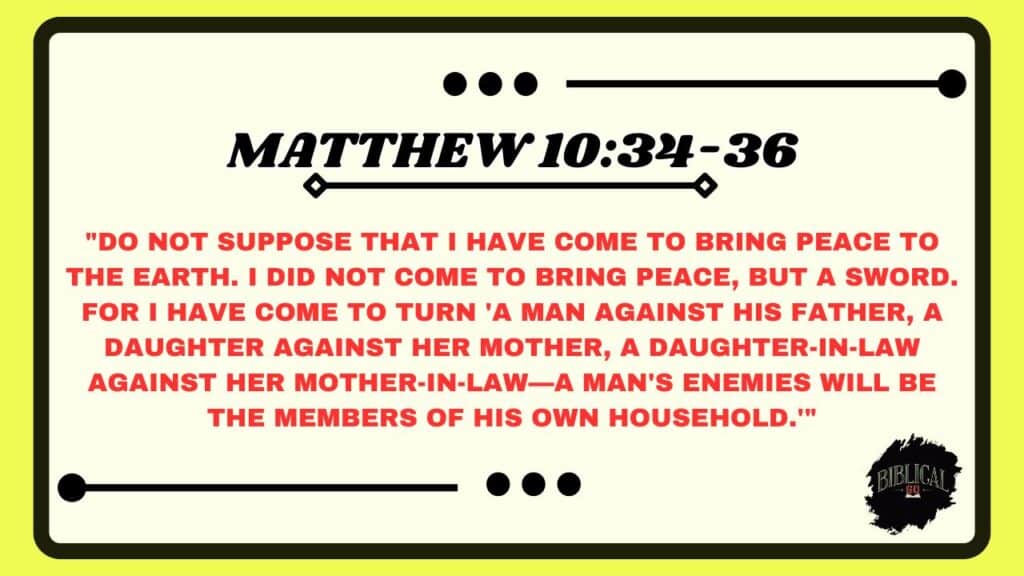
Jesus acknowledges that following him might create division within families. This passage validates the reality that spiritual growth sometimes requires separation from family members who oppose your faith or values.
4. 1 Corinthians 15:33
“Do not be misled: ‘Bad company corrupts good character.'”
This principle applies universally, including to family relationships. Continual exposure to relatives with destructive patterns can negatively influence your own character and decisions. Setting boundaries protects your spiritual and emotional integrity.
5. Psalm 1:1
“Blessed is the one who does not walk in step with the wicked or stand in the way that sinners take or sit in the company of mockers.”
This verse describes a progression of increasing involvement with negative influences. While not specifically about family, it reminds us that limiting exposure to toxic behaviors—from anyone—is spiritually wise.
Also Read: 36 Bible Verses About Cheating Husbands (Explained)
Finding Healing and Forgiveness
6. Ephesians 4:31-32
“Get rid of all bitterness, rage and anger, brawling and slander, along with every form of malice. Be kind and compassionate to one another, forgiving each other, just as in Christ God forgave you.”
Toxic family situations often leave emotional wounds. This verse encourages releasing bitterness while establishing healthier patterns. Forgiveness doesn’t mean continued exposure to harm but rather an internal release that frees you from resentment.
7. Romans 12:19-21
“Do not take revenge, my dear friends, but leave room for God’s wrath, for it is written: ‘It is mine to avenge; I will repay,’ says the Lord. On the contrary: ‘If your enemy is hungry, feed him; if he is thirsty, give him something to drink. In doing this, you will heap burning coals on his head.’ Do not be overcome by evil, but overcome evil with good.”
When hurt by family members, our natural response might be retaliation. This passage calls us to a higher standard while acknowledging the reality of harmful behavior. You can choose not to perpetuate toxic cycles while trusting God with justice.
8. Matthew 6:14-15
“For if you forgive other people when they sin against you, your heavenly Father will also forgive you. But if you do not forgive others their sins, your Father will not forgive your sins.”
Forgiveness doesn’t equal reconciliation or continued close relationship. Rather, it’s releasing the debt and leaving consequences to God. This challenging teaching reminds us that our own spiritual health requires letting go of resentment toward toxic family members.
9. Colossians 3:13
“Bear with each other and forgive one another if any of you has a grievance against someone. Forgive as the Lord forgave you.”
Forgiving difficult family members doesn’t mean accepting continued mistreatment. It means releasing the debt emotionally while still establishing appropriate boundaries to prevent future harm.
10. Psalm 147:3
“He heals the brokenhearted and binds up their wounds.”
Family wounds can cut deeply, but God specializes in healing broken hearts. When earthly family fails us, our heavenly Father offers comfort and restoration that no human relationship can provide.
Also Read: 37 Important Bible Verses About Eagles (Explained)
Prioritizing Your Spiritual Family
11. Mark 3:33-35
“‘Who are my mother and my brothers?’ he asked. Then he looked at those seated in a circle around him and said, ‘Here are my mother and my brothers! Whoever does God’s will is my brother and sister and mother.'”
Jesus redefined family beyond blood relations. When biological family becomes toxic, this passage reminds us that our spiritual family—fellow believers—can fulfill the connection and support we need.
12. Psalm 27:10
“Though my father and mother forsake me, the Lord will receive me.”
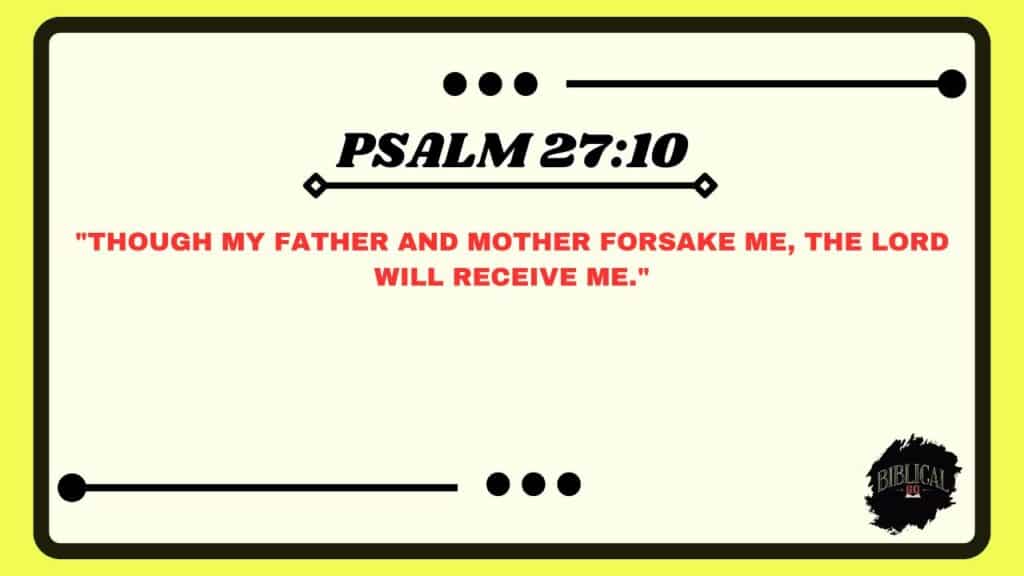
David acknowledges the painful reality that even parents can abandon their children. Yet God’s faithful presence remains, providing the acceptance and love that toxic family members withhold.
13. Matthew 12:46-50
“While Jesus was still talking to the crowd, his mother and brothers stood outside, wanting to speak to him. Someone told him, ‘Your mother and brothers are standing outside, wanting to speak to you.’ He replied, ‘Who is my mother, and who are my brothers?’ Pointing to his disciples, he said, ‘Here are my mother and my brothers. For whoever does the will of my Father in heaven is my brother and sister and mother.'”
Jesus demonstrates that spiritual bonds can be stronger than biological ones. This passage offers hope to those whose family relationships are broken or toxicwe can find meaningful connection in our faith community.
14. Proverbs 17:17
“A friend loves at all times, and a brother is born for a time of adversity.”
Sometimes friends demonstrate more consistent love than biological family. This verse validates that supportive relationships outside family can fulfill important roles in our lives when blood relatives fail us.
15. Galatians 6:10
“Therefore, as we have opportunity, let us do good to all people, especially to those who belong to the family of believers.”
Paul instructs us to prioritize caring for fellow believers. This creates a spiritual family that can provide the healthy relationships and support that toxic biological families lack.
Also Read: 36 Bible Verses About Removing People From Your Life
Responding to Verbal and Emotional Abuse
16. Proverbs 15:1
“A gentle answer turns away wrath, but a harsh word stirs up anger.”
When dealing with volatile family members, this wisdom helps prevent escalation. A calm response doesn’t guarantee changed behavior but reduces the likelihood of intensifying conflict.
17. Proverbs 26:4-5
“Do not answer a fool according to his folly, or you yourself will be just like him. Answer a fool according to his folly, or he will be wise in his own eyes.”
These seemingly contradictory proverbs offer nuanced wisdom for dealing with difficult people. Sometimes engaging with toxic family members only encourages their behavior; other times, clear boundaries must be set. Discernment is needed for each situation.
18. Ephesians 6:4
“Fathers, do not exasperate your children; instead, bring them up in the training and instruction of the Lord.”
This verse acknowledges that parents can provoke or embitter their children through harmful patterns. If you experienced this growing up, Scripture validates your experience while calling for healthier family dynamics.
19. Colossians 3:21
“Fathers, do not embitter your children, or they will become discouraged.”
God recognizes that parental behavior can deeply wound children. This instruction confirms that emotional harm within families violates God’s design, giving validation to those who’ve experienced toxic parenting.
20. Proverbs 12:18
“The words of the reckless pierce like swords, but the tongue of the wise brings healing.”
This verse acknowledges the damaging power of harsh words, which are often weapons in toxic family dynamics. Recognizing verbal abuse as harmful, not just “the way families talk,” is biblically justified.
Also Read: 35 Important Bible Verses About Dads And Daughters
Breaking Generational Patterns
21. Ezekiel 18:2-4
“What do you people mean by quoting this proverb about the land of Israel: ‘The parents eat sour grapes, and the children’s teeth are set on edge’? As surely as I live, declares the Sovereign Lord, you will no longer quote this proverb in Israel. For everyone belongs to me, the parent as well as the childboth alike belong to me. The one who sins is the one who will die.”
God challenges the notion that children must bear their parents’ consequences. This passage affirms that you can break toxic family patterns and establish a new legacy.
22. 2 Corinthians 5:17
“Therefore, if anyone is in Christ, the new creation has come: The old has gone, the new is here!”
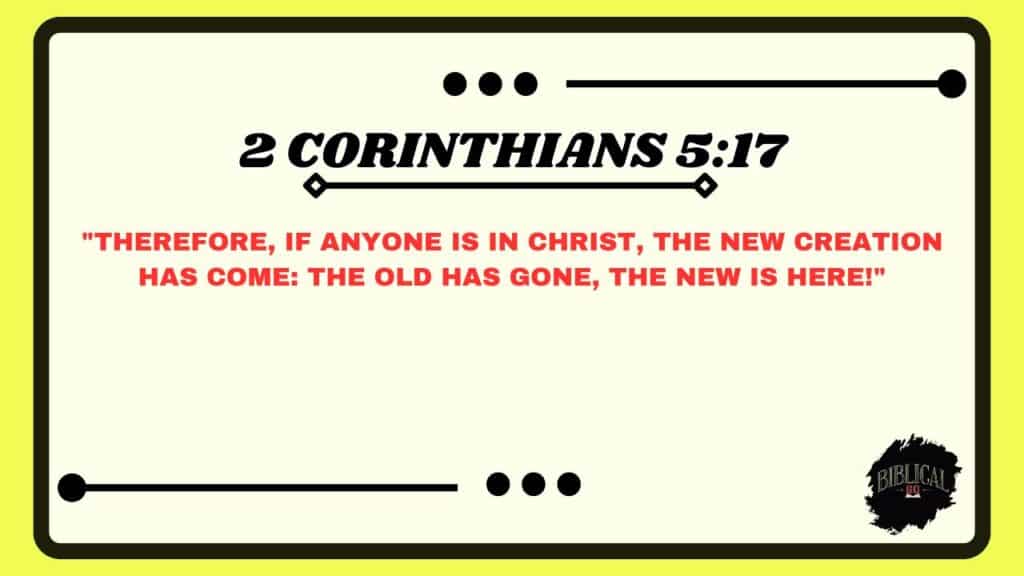
Your identity in Christ supersedes family dysfunction. Through faith, you can experience transformation that breaks generational cycles of toxicity and establishes healthier patterns.
23. Jeremiah 31:29-30
“In those days people will no longer say, ‘The parents have eaten sour grapes, and the children’s teeth are set on edge.’ Instead, everyone will die for their own sin; whoever eats sour grapestheir own teeth will be set on edge.”
God establishes individual accountability, liberating us from the belief that we must perpetuate unhealthy family patterns. Each person can choose a different path regardless of their family history.
24. Joshua 24:15
“But if serving the Lord seems undesirable to you, then choose for yourselves this day whom you will serve, whether the gods your ancestors served beyond the Euphrates, or the gods of the Amorites, in whose land you are living. But as for me and my household, we will serve the Lord.”
Joshua’s declaration demonstrates that we can choose different values than our ancestors. When family patterns are harmful, we have divine permission to establish new, healthier traditions.
25. Deuteronomy 30:19
“This day I call the heavens and the earth as witnesses against you that I have set before you life and death, blessings and curses. Now choose life, so that you and your children may live.”
God empowers us to choose life-giving paths even when our family history tends toward destruction. This verse encourages breaking toxic cycles for your own wellbeing and future generations.
Also Read: 36 Important Bible Verses About Hunting (Explained)
Finding Identity Beyond Family Dysfunction
26. Galatians 4:6-7
“Because you are his sons, God sent the Spirit of his Son into our hearts, the Spirit who calls out, ‘Abba, Father.’ So you are no longer a slave, but God’s child; and since you are his child, God has made you also an heir.”
Your primary identity comes from your relationship with God, not your earthly family. This spiritual reality provides stability when family relationships are unstable or harmful.
27. Romans 8:15-16
“The Spirit you received does not make you slaves, so that you live in fear again; rather, the Spirit you received brought about your adoption to sonship. And by him we cry, ‘Abba, Father.’ The Spirit himself testifies with our spirit that we are God’s children.”
For those from fearful or abusive family environments, this verse offers the security of God’s perfect parental love. You can experience true belonging in God’s family regardless of earthly family dysfunction.
28. 1 Peter 2:9
“But you are a chosen people, a royal priesthood, a holy nation, God’s special possession, that you may declare the praises of him who called you out of darkness into his wonderful light.”
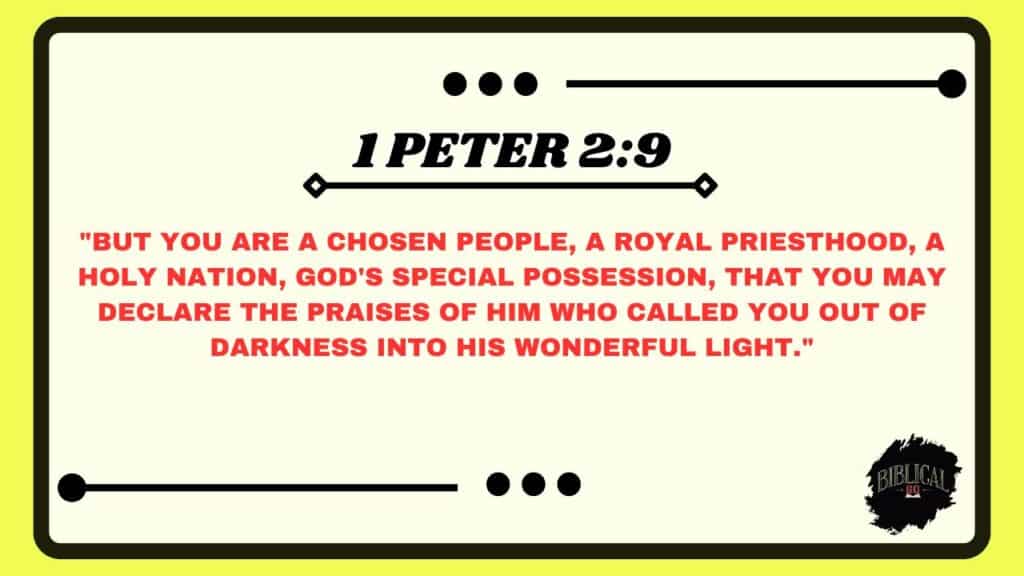
Your value comes from God’s choice of you, not your family’s treatment. This royal identity transcends any rejection or devaluation you may have experienced from toxic relatives.
29. Psalm 139:13-14
“For you created my inmost being; you knit me together in my mother’s womb. I praise you because I am fearfully and wonderfully made; your works are wonderful, I know that full well.”
When toxic family members have damaged your self-worth, this truth remains: you are God’s intentional creation, designed with purpose and value regardless of how family has treated you.
30. Isaiah 43:1
“But now, this is what the Lord sayshe who created you, Jacob, he who formed you, Israel: ‘Do not fear, for I have redeemed you; I have summoned you by name; you are mine.'”
God claims you personally, by name. This intimate connection offers security when family relationships feel tenuous or harmful.
Also Read: 38 Bible Verses About Sisters In Christ (Explained)
Wisdom for Specific Family Situations
31. 1 Timothy 5:8
“Anyone who does not provide for their relatives, and especially for their own household, has denied the faith and is worse than an unbeliever.”
While this verse establishes family responsibility, it also implicitly acknowledges that some believers may have family members who fail to fulfill their obligations—a recognition of family dysfunction.
32. Matthew 7:9-11
“Which of you, if your son asks for bread, will give him a stone? Or if he asks for a fish, will give him a snake? If you, then, though you are evil, know how to give good gifts to your children, how much more will your Father in heaven give good gifts to those who ask him!”
Jesus acknowledges the basic parental duty to provide for children’s needs. This establishes a baseline expectation that toxic parents often fail to meet, validating the experience of those with neglectful family members.
33. Luke 15:11-32
The Prodigal Son parable shows both family dysfunction (the younger son’s rebellion, the older son’s resentment) and healing (the father’s unconditional love). This story acknowledges family conflict while pointing toward reconciliation when genuine repentance occursnot forced reunion without changed behavior.
Also Read: 37 Bible Verses About the Wicked Being Punished (Explained)
Practical Application: Setting Boundaries with Toxic Family
Living out these biblical principles requires wisdom and courage. Here are some practical ways to apply these verses:
- Limit exposure: Reduce contact with family members who consistently undermine your wellbeing.
- Establish clear boundaries: Communicate what behaviors you will and won’t accept.
- Maintain emotional distance: You can be physically present at necessary gatherings while protecting your heart.
- Seek wise counsel: Work with trusted mentors, pastors, or counselors to navigate complex family dynamics.
- Build a spiritual family: Invest in healthy relationships with fellow believers who demonstrate Christ’s love.
- Practice forgiveness without enabling: Release resentment without removing consequences for harmful behavior.
- Pray for healing: Ask God to work in your family while accepting that change requires others’ willingness.
- Honor without endangering: Find ways to respect parents that don’t expose you to continued harm.
Conclusion: Bible Verses About Toxic Family (Explained)
God’s Word acknowledges the painful reality of toxic family relationships while offering wisdom for navigating them. Scripture doesn’t demand unlimited vulnerability to harmful relatives but rather provides a balanced approach of wisdom, boundaries, forgiveness, and finding your true identity in Christ.
When family relationships become sources of consistent pain rather than blessing, these verses remind us that our ultimate belonging comes from our heavenly Father. God’s perfect love can heal wounds inflicted by imperfectand sometimes toxic family members.
Remember that setting boundaries with harmful relatives isn’t unbiblical; it’s stewardship of the emotional, spiritual, and physical health God has entrusted to you. With divine wisdom, you can honor family relationships without sacrificing your wellbeing on the altar of unhealthy expectations.
FAQs About Toxic Family Relationships
Q: Does the Bible really allow me to distance myself from toxic family members?
A: Yes. While Scripture values family relationships, verses like 2 Timothy 3:1-5 instruct believers to “have nothing to do with” people demonstrating consistently harmful patterns. Jesus himself acknowledged that following him could create family division (Matthew 10:34-36).
Q: How can I honor my parents if they’re toxic or abusive?
A: Honoring parents doesn’t require enduring abuse. You can honor them by praying for them, speaking respectfully about them, seeking their wellbeing from a distance, and breaking destructive family cycles. Honor doesn’t demand unlimited access or relationship without boundaries.
Q: Should I always forgive toxic family members?
A: Scripture calls believers to forgive, but forgiveness doesn’t equal reconciliation or continued close relationship. You can release the debt emotionally while maintaining boundaries that protect you from further harm.
Q: What if my toxic family members use the Bible to manipulate me?
A: Scripture misused becomes a weapon rather than wisdom. Seek guidance from objective spiritual leaders who can help you distinguish between biblical principles and manipulation disguised as spirituality.
Q: How do I break generational patterns of toxicity?
A: Acknowledge unhealthy patterns, seek healing through counseling and prayer, intentionally learn healthy relationship skills, surround yourself with positive examples, and root your identity in Christ rather than family dysfunction.
Read more knowledgeable blogs on Biblical Go

Piper McMillan is a devoted writer and Bible enthusiast, offering insightful guides on Bible verses. Her blog provides practical interpretations and reflections, helping readers deepen their faith and understanding of Scripture through accessible and inspiring content.

